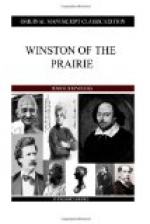Maud Barrington, to her annoyance, felt the blood creep to her forehead, but she looked at the man steadily, noticing the quiet forcefulness beneath his somewhat caustic amusement.
“Yes,” she said, simply; “and I shall be grateful.”
In another few minutes she was galloping across the prairie, and when she rejoined her aunt and Barrington, endeavored to draw out the latter’s opinion respecting Courthorne’s venture by a few discreet questions.
“Heaven knows where he was taught it, but there is no doubt that the man is an excellent farmer,” he said. “It is a pity that he is also to all intents and purposes mad.”
Miss Barrington glanced at her niece, and both of them smiled, for the Colonel usually took for granted the insanity of any one who questioned his opinions.
In the meanwhile Winston sat swaying on the driving-seat, mechanically guiding the horses, and noticing how the prairie sod rolled away in black waves beneath the great plow. He heard the crackle of fibers beneath the triple shares, and the swish of greasy loam along the moldboard’s side, but his thoughts were far away, and when he raised his head, he looked into the dim future beyond the long furrow that cut the skyline on the rise.
It was shadowy and uncertain, but one thing was clear to him, and that was that he could not stay at Silverdale. At first, he had almost hoped he might do this, for the good land and the means of efficiently working it had been a great temptation. That was before he reckoned on Maud Barrington’s attractions, but of late he had seen what these were leading him to, and all that was good in him recoiled from an attempt to win her. Once he had dared to wonder whether it could be done, for his grim life had left him self-centered and bitter, but that mood had passed, and it was with disgust he looked back upon it. Now he knew that the sooner he left Silverdale the less difficult it would be to forget her, but he was still determined to vindicate himself by the work he did, and make her affairs secure. Then, with or without a confession, he would slip back into the obscurity he came from.
While he worked the soft wind rioted about him, and the harbingers of summer passed north in battalions overhead—crane, brant-goose, and mallard, in crescents, skeins, and wedges, after the fashion of their kind. Little long-tailed gophers whisked across the whitened sod, and when the great plow rolled through the shadows of a bluff, jack rabbits, pied white and gray, scurried amidst the rustling leaves. Even the birches were fragrant in that vivifying air, and seemed to rejoice as all animate creatures did, but the man’s face grew more somber as the day of toil wore on. Still, he did his work with the grim, unwavering diligence that had already carried him, dismayed but unyielding, through years of drought and harvest hail, and the stars shone down on the prairies when at last he loosed his second team.




